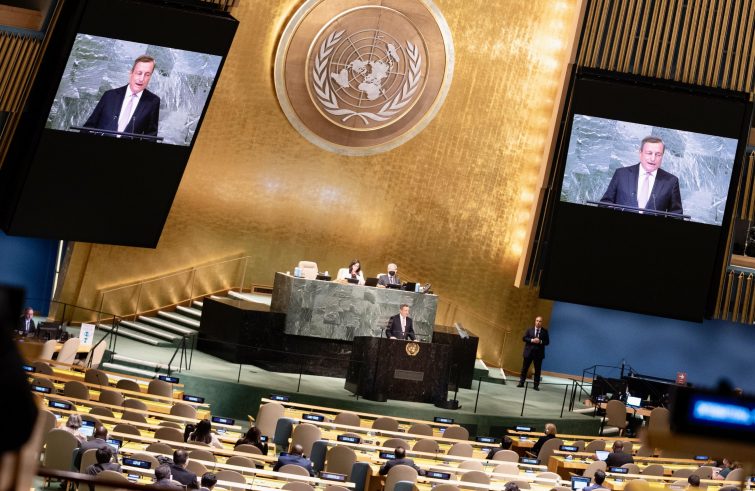
(from New York) Mario Draghi’s last speech as Prime Minister to the Heads of State and Government gathered at the 77th UN General Assembly lasted 18 minutes. He was the last speaker of yesterday’s session. The last to reiterate, once again, the tragic consequences of the Russia-Ukraine war, which reverberate at international level, while “the outcome of the conflict remains unpredictable,” and “it is our collective responsibility to find answers.”
The war. “Russia’s aggression of Ukraine and the various crises that have resulted – food, energy, economic – are putting our collective ideals at risk in a way that
has rarely happened since the end of the Cold War”, Draghi said in the opening lines of his speech, reiterating that “the responsibilities for the conflict are clear – and one-sided.” The Italian Prime Minister emphasised repeatedly his strong commitment to multilateralism with a spirit of solidarity and cooperation, especially in finding a solution to “a war of aggression in Europe.” “We cannot divide ourselves into North and South”, Draghi recommended, while describing a horror that was thought never to happen again on European soil. “Imperial ambitions, militarism, systematic violations of civil and human rights seemed to belong to the last century. Since February, however, we have witnessed the bombing of theatres, schools, hospitals; we have seen terrible attacks and violence on civilians, on children.”
The Prime Minister described the atrocities whilst at the same time detailing the implications of the sanctions imposed on the Russia and its consequences not only on Moscow’s economy but also on its military apparatus. He went on to point out – to all those who consider the sanctions useless – that “the impact will grow over time.”
Draghi defended Italy’s decision to side with Kyiv. He clarified that “helping Ukraine to protect itself was not only the right choice to make. It was the only choice consistent with the ideals of justice and fraternity that underlie the United Nations Charter.” In response to criticism made in his homeland over the military aid, which eroded confidence in the government he will be chairing for just a few more days, Italy’s PM argued that “a military invasion planned months earlier” could not be stopped “with words alone.” He firmly condemned the referenda for independence in the Donbass: “a new violation of international law.” Draghi expressed his wish for peace, hoping that Russia will return under the aegis of international law.
Solidarity. “The horrors of war are best answered with the warmth of solidarity”, Draghi said, thanking the UN Secretary and Turkey for the agreement on Ukrainian grain exports that averted a humanitarian catastrophe. Speaking once again in defence of multilateralism, he quoted Mikhail Gorbachev’s address at the UN General Assembly in 1988, when he noted how “in a globalized world, force or the threat of its use could no longer function as an instrument of foreign policy”, while the “principles underlying this assembly” are “respect for human rights, international cooperation, and non-belligerence.” The Prime Minister mentioned the response to the pandemic as an example of solidarity, and that it managed to “overcome protectionism in sanitary products” and distribute more than 1.4 billion doses of Covid-19 vaccines through the COVAX mechanism. He went on to thank UN institutions for their support in the management of migration in the Mediterranean.
The Green Transition. While Moscow’s threat to use gas sales as a means of blackmail against Europe hampered environmental protection, nuclear threats to militarise the Zaporizhzhya power plant once again require cooperation for a peaceful solution.
Draghi pointed out that complete independence from Russian energy is expected by as early as 2024, thanks to many African countries such as Algeria, Angola, and the Republic of Congo.
“We want to develop green technologies together, to put Africa squarely at the centre of the green transition”, Draghi said, for “the war in Ukraine has redrawn energy geography and with it, geopolitics.” And while “the European Union is set to look increasingly to the south”, “Italy can be a bridge to the southern shore of the Mediterranean.”
Europe and Italy’s future. The war in Ukraine “has awakened or strengthened the desire for Europe in many countries”, said the Prime Minister, reaffirming his support to Ukraine’s bid for EU membership and the integration of the Western Balkans, Moldova, and Georgia into the European Union. Draghi highlighted the country’s role on the international stage during the G20 presidency and reiterated Rome’s readiness to host Expo 2030. Finally, the Prime Minister sent a clear message to those afraid that a win of the right-wing coalition in next Sunday’s elections could embitter the country’s relations with its allies. “The United Nations remains our main point of reference”, Draghi said, adding that “in the coming years, Italy will continue to be a protagonist in the EU, close to its NATO allies, ready to listen and open to dialogue, determined to contribute to international peace and security.” It was Draghi’s final pledge at the UN podium, one which international observers will be monitoring closely once Mario is no longer at the helm of the Italian government.


